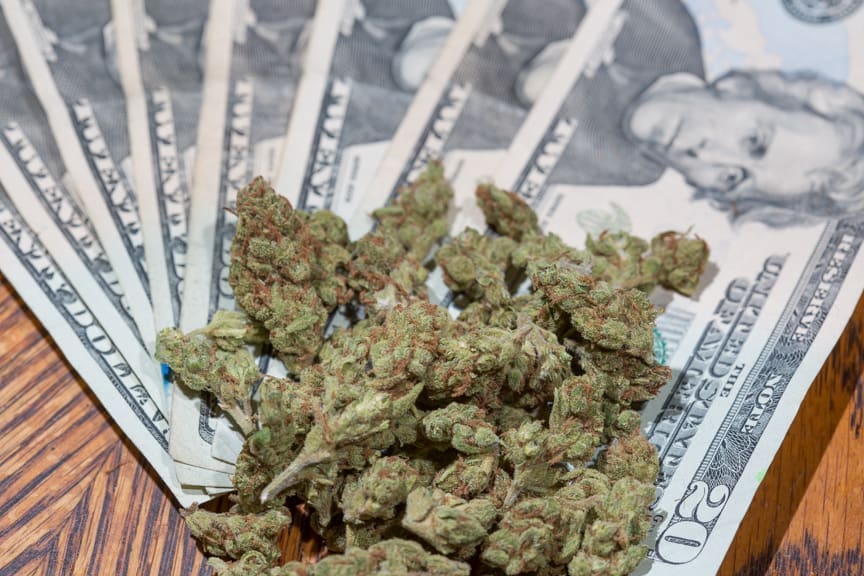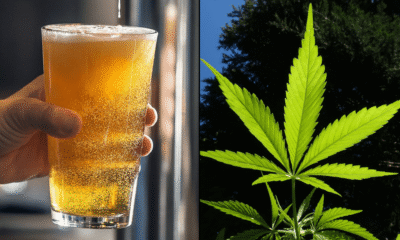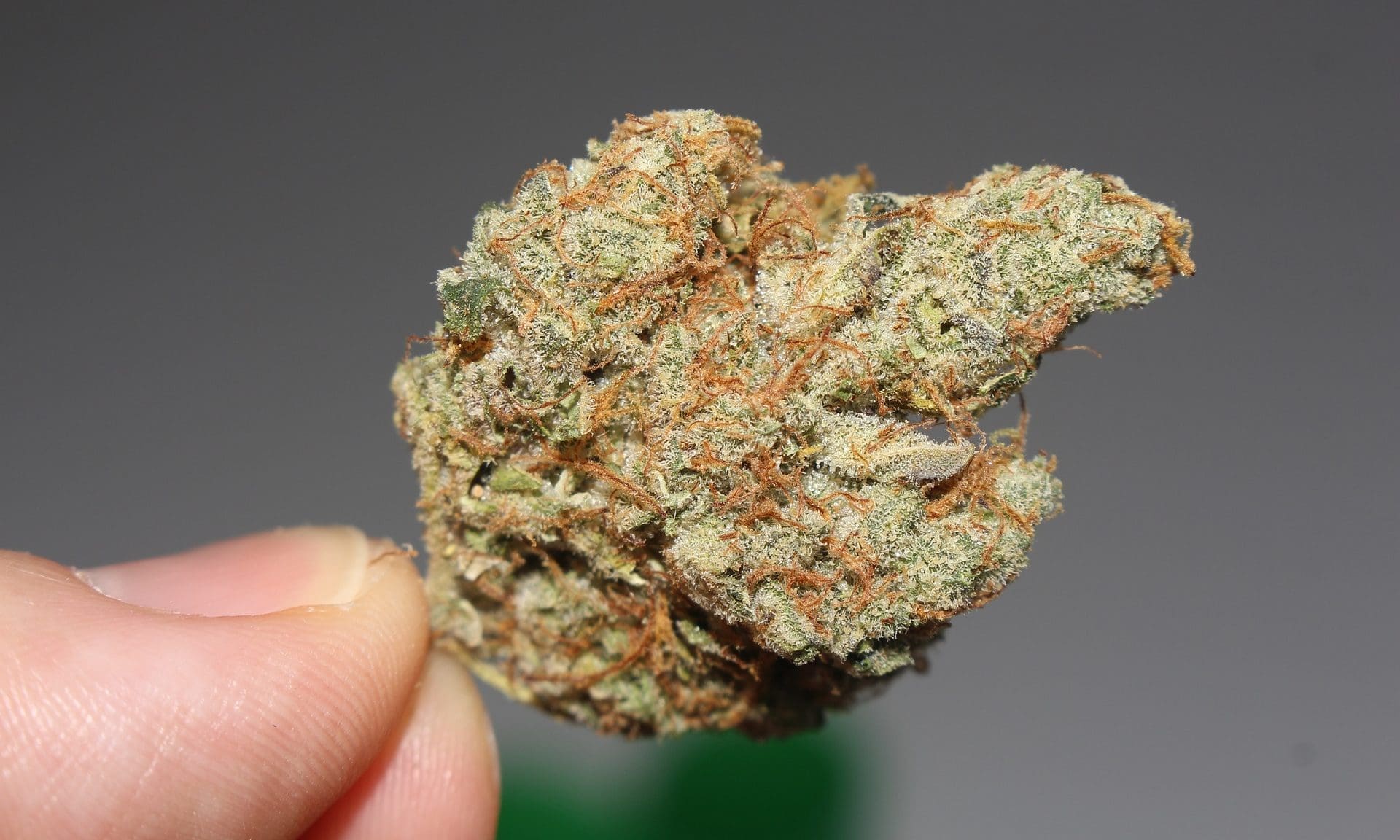featured
West Virginia Medical Marijuana Revenue Is Supposed To Support Drug Treatment Programs, But Sits Unspent As Officials Worry About Federal Prohibition
Published
4 hours agoon

“The money in the fund will remain unallocated until federal law changes.”
By Nicole Blevins, Mountain State Spotlight
This story was originally published by Mountain State Spotlight. Get stories like this delivered to your email inbox once a week; sign up for the free newsletter at https://mountainstatespotlight.org/newsletter.
Since the state’s first dispensary opened in 2021, West Virginia’s medical cannabis program has collected roughly $34 million in taxes, licensing fees and interest.
State law requires the money be used to create a medical cannabis research program, provide resources to residents with substance use disorder and fund law enforcement training.
But almost four years later, the money sits unspent.
Cannabis is still an illegal drug at the federal level. Traditional banks were unwilling to hold the state’s cannabis dollars, so they’re held at a credit union under control of the state treasurer’s office.
“The money in the fund will remain unallocated until federal law changes,” said treasurer’s office spokesperson Carrie Hodousek.
But other states with legal cannabis markets, including Maryland, Pennsylvania and Ohio, are spending their tax revenue.
A medical cannabis rollout made rocky by federal law and fearful banks
In 1970, the federal government classified marijuana as a Schedule I drug, a designation that finds it has no medical use and a high potential for misuse. Today, 40 states have legalized recreational or medical cannabis use despite the federal classification.
West Virginia’s 2017 Medical Cannabis Act allowed licensed physicians to issue medical cannabis cards to patients seeking alternative treatment for serious health conditions.
But it took over four years from the time the bill was passed for patients to get medical cannabis from a dispensary in West Virginia.
In 2018, then-Treasurer John Perdue said banks refused to hold funds from the program because they did not want to be held liable for interacting with money from an illegal substance.
Perdue sought an advisory opinion from then-Attorney General Patrick Morrisey to determine the best way to legally handle the program’s finances. Morrisey found the federal government had not gone after other states with medical cannabis markets, but there was no guarantee it would continue to refrain from doing so.
Licenses for growers, processors or dispensaries had not been dispersed by the state because there was nowhere to collect the permit fees. It wasn’t until March 2019 that lawmakers changed the state law to allow a credit union to hold the money.
Element Federal Credit Union—which was already planning to provide banking services to the state’s cannabis industry—won the bid to hold the tax dollars.
“It’s up to the individual bank if they want to take that risk. It’s a big risk because it’s federally illegal,” said CEO Linda Bodie. “We obviously took the risk.”
Former delegate and then-Republican candidate for state treasurer Riley Moore criticized Perdue for the continued delay in the program in a 2019 opinion published in the Charleston Gazette-Mail.
“Clearly, West Virginia needs a modernized, transparent and proactive state treasurer’s office,” he wrote. Moore defeated Perdue in the 2020 election.
After planting, harvesting and processing cannabis into consumable products, the first dispensary opened in November 2021 and began generating tax revenue.
During Moore’s four-year term as state treasurer, the medical cannabis program generated millions of dollars that went into the fund but were not spent. Moore, now a U.S. representative, did not respond to questions about the fund.
Lawmakers who helped write the state’s medical cannabis laws were surprised that the money is sitting at a credit union.
“I was not aware of that,” said Del. Mike Pushkin, D-Kanawha, “That’s the first I’ve heard of it, that it wasn’t being spent.”
Pushkin helped craft the 2019 cannabis banking legislation. He said there were no discussions he was involved in during that legislative session, or after, that suggested the fund would stall.
Sen. Mike Woelfel, D-Cabell, who wrote the original version of the Medical Cannabis Act, also said he wasn’t aware the money was stockpiling. After learning the status of the fund, he spoke with the current treasurer.
“I think this has come to the attention of Treasurer Larry Pack, and I think he’s summoned the experts to find a way to meet the expectations of the bill and to make this work,” Woelfel said.
As West Virginia sits on its funds, other states put cannabis taxes to use
Meanwhile, Maryland, Ohio and Pennsylvania all have legal cannabis markets and are distributing the tax revenue as it’s designated in state laws.
Ohio has distributed over $35 million to its general fund, and nearly two-thirds of the cannabis tax revenue will be allocated to its general fund beginning this fiscal year. But the rest, which goes to Ohio’s Host Community Cannabis Fund, has not been disbursed to individual municipalities due to a lack of appropriation by the state legislature, said Ohio Office of Budget and Management spokesperson Pete LuPiba.
In Pennsylvania, medical marijuana revenue has supported drug and alcohol programs and its Commission on Crime and Delinquency, said Pennsylvania Department of Revenue spokesperson Jeffrey Johnson. The state has not been able to establish a medical marijuana research program because of complications with federal law.
A third of Maryland’s cannabis tax revenue goes to a fund aimed to help communities disproportionately affected by drug use. The rest goes to the state’s general budget, counties and public health efforts.
Andrew Livingston, Director of Economics and Market Analysis at Vicente LLP, a national cannabis law firm, said he is not aware of a systemic issue where cannabis tax revenue cannot be spent in states with legal markets.
How could allocations from the fund help West Virginians now?
Woelfel introduced the Medical Cannabis Act with a key requirement to establish a medical cannabis research program. It would determine whether the medical cannabis program was helping and where it could be improved.
“To me, that was a very important part of the bill,” he said.
State Department of Health spokesperson Gailyn Markham said it has not been created due to the inability to access funds.
If West Virginia distributed the entire fund today, roughly $19 million would go back to the Bureau for Public Health within the Department of Health, nearly $8 million to the Fight Substance Abuse Fund overseen by the Department of Health, $6 million to the Division of Justice and Community Services and $1.5 million to a special revenue account for law enforcement professional training and professional development programs.
Dr. Matthew Christiansen, former state health officer from 2023-2024, said he asked but couldn’t get a clear answer of how much money was in the fund.
He said West Virginia has struggled more than any other state in the nation with addiction, and there is a lack of sustainable funding for treatment and recovery programs. Federal funding has declined, but he said the tax revenue could ease the gap.
Federal cuts include money to the Department of Justice’s Office of Justice Programs, which helped divert people with an intoxication or a possession charge into treatment instead of prison.
Christiansen said the state’s revenue from medical cannabis could be used in other ways as well.
“It’s a significant amount of money. It could be used to help quite a few people, or stand up specific programs for a period of years that would make a positive impact for people with addiction,” he said. “It’s nothing to sneeze at.”
He said this fund could also provide access to resources for the small percentage of medical cannabis patients who develop a cannabis use disorder.
Elizabeth Shahan, executive director of West Virginia Prevention Solutions, a nonprofit focused on substance use prevention, said the organization has struggled with the loss of federal funding to address the needs of West Virginians.
The West Virginia Division of Tobacco Prevention RAZE program closed this summer. It was a program aimed to educate youth about the dangers of smoking, vaping and tobacco use. West Virginia is currently leading the nation in teen vaping, according to a study conducted by Drugwatch.
“That fund alone could secure that evidence-based prevention education in school systems,” Shahan said.
Medical cannabis was brought to the state as an economic driver, she said, and businesses, prevention programs and medical cannabis patients all have a shared value to prevent harm in young populations.
“Every dollar that’s available for prevention really needs to be invested in prevention,” Shahan said. “If it sits, it doesn’t do anyone any good.”
This article first appeared on Mountain State Spotlight and is republished here under a Creative Commons Attribution-NoDerivatives 4.0 International License.![]()

Author: mscannabiz.com
MScannaBIZ for all you Mississippi Cannabis News and Information.
You may like
-


Whiskey Company Scales Back Operations, Citing ‘Consumer Shifts’ Toward Marijuana As Alcohol Alternative
-


Smart Cannabis: The AI Revolution No Operator Can Ignore
-


New Jersey Gubernatorial Candidates Need To Step Up For Cannabis Consumers (Op-Ed)
-


Millennials Are Spending Big on Luxury Travel
-


Frequent Marijuana Use Is Tied To Lower Risk Of Liver Disease From Alcohol, New Study Finds
-


Ohio bill to scale back cannabis legalization passed by House (Newsletter: October 23, 2025)
featured
Whiskey Company Scales Back Operations, Citing ‘Consumer Shifts’ Toward Marijuana As Alcohol Alternative
Published
9 minutes agoon
October 23, 2025
A popular independent craft spirits distillery says it’s scaling back its operations—due in part to the fact that more adults are choosing marijuana over alcohol.
Heritage Distilling Company, Inc.–which has distillery locations for its whiskey and other spirits in Oregon and Washington State where cannabis is legal—said on Thursday that a confluence of factors informed its decision to close tasting rooms, shift to contract production partnerships and focus on direct-to-consumer sales.
The company listed four specific considerations that led to the consolidation of its operations. That includes “consumer shifts toward reduced alcohol consumption and alternative products, including marijuana.”
That shift is being closely monitored across the alcohol industry. Earlier this year, the CEO of Brown-Forman Corporation, which produces brands such as Jack Daniel’s and Woodford Reserve, said that the growing use of marijuana as an alternative to alcohol is putting “pressure” on the spirits industry.
This week, new congressional lobbying reports shows that many major companies such as Anheuser-Busch, Bacardi North America and Moet Hennessy USA are engaged in federal lobbying to influence cannabis policy amid the surge in interest into THC beverages.
“For more than a decade, Heritage Distilling tasting rooms were places for friends and family to gather to enjoy each other’s company and great spirits,” Jennifer Stiefel, president of Heritage Distilling, said in a press release on Thursday. “As we head into the final stretch of the year, we wanted to give our customers and club members two months of lead time to plan their final visits to our tasting rooms, to share in great memories and to thank the staff who helped them along their customer journey.”
The company also listed tax and regulatory challenges in Oregon and Washington State as additional reasons for the business model change.
The fact that evolving consumer preferences for cannabis factored into the decision isn’t entirely surprising, as there have been many recent market analyses and surveys indicating that marijuana legalization has proved to be a disruptive force for the alcohol industry.
A poll released earlier this month found that a majority of Americans believe marijuana represents a “healthier option” than alcohol—and most also expect cannabis to be legal in all 50 states within the next five years.
Another recent survey showed that four in five adults who drink cannabis-infused beverages say they’ve reduced their alcohol intake—and more than a fifth have quit drinking alcohol altogether.
That survey was released shortly after a leading alcohol industry group added a company that makes THC-infused drinks to its membership roster for the first time, furthering signaling the cultural shift.
This also comes at a time when younger Americans are increasingly using cannabis-infused beverages as a substitute for alcohol—with one in three millennials and Gen Z workers choosing THC drinks over booze for after-work activities like happy hours, according to a new poll of 1,000 young professionals.
This month it was revealed that the retail giant Target is soft launching sales of THC-infused beverages at select stores in Minnesota.
Meanwhile, Veterans of Foreign Wars (VFW) of the United States recently entered a first-of-its-kind partnership with a hemp THC beverage company, with a licensing branding deal that will support a variety of veterans services and promote cannabis drinks as a potential alcohol alternative with the drinks being available at VFW posts across the country.
Separately, while Target is apparently moving into the THC drink space, the airline Virgin Atlantic denied satirical and false claims earlier this year from a cannabis beverage company about a deal to sell its THC-infused beverages on flights.

Author: mscannabiz.com
MScannaBIZ for all you Mississippi Cannabis News and Information.
featured
Smart Cannabis: The AI Revolution No Operator Can Ignore
Published
1 hour agoon
October 23, 2025
AI isn’t coming to cannabis; it’s already here. From automated grow rooms to predictive inventory systems and compliance bots, cannabis is quietly entering its most advanced era ever. And just like legalization, the tech revolution won’t wait for anyone.
The global artificial intelligence market reached $196.63 billion in 2023 and is projected to grow at a compound annual growth rate of 37.3% through 2030. This isn’t just another tech bubble; AI and automation are fundamentally reshaping how businesses operate across every sector. From healthcare systems using machine learning to diagnose diseases faster than human doctors, to financial institutions preventing fraud through real-time pattern recognition, to manufacturing plants reducing waste by 30% through predictive maintenance algorithms, the integration of intelligent technology has moved from experimental to essential.
The numbers tell the story: McKinsey research shows that generative AI could add $2.6 trillion to $4.4 trillion annually across business use cases, representing a 15 to 40 percent increase in the overall impact of artificial intelligence. In retail, AI-driven inventory management has reduced stockouts by up to 65%. In agriculture, precision farming using IoT sensors and machine learning has increased crop yields by 20% while reducing water usage by 25%. These aren’t theoretical benefits; they’re measurable improvements happening right now across industries worldwide.
Cannabis Embraces the Digital Revolution
Legalization created the market. Technology will decide who wins it.
The cannabis industry, valued at $36.70 billion in North America in 2023, is experiencing its own technological transformation. With the North American cannabis technology market expected to grow at a 28.3% CAGR through 2030, cannabis businesses are discovering that success increasingly depends on smart technology adoption.
The unique challenges facing cannabis businesses make AI and tech solutions not just helpful, but necessary for survival. Complex state-by-state regulations require meticulous compliance tracking that human teams struggle to maintain accurately. Inventory shrinkage costs the industry millions annually, while manual compliance reporting consumes resources that could be directed toward growth. Customer expectations mirror those in mainstream retail; they want personalized experiences, fast service, and consistent product quality.
Smart cannabis businesses are responding with sophisticated solutions. Cultivation facilities use AI-powered sensors to monitor environmental conditions 24/7, adjusting humidity, temperature, and lighting to optimize yields while reducing energy costs. Dispensaries deploy machine learning algorithms to predict customer demand, ensuring popular products stay in stock while minimizing waste from slow-moving inventory. Compliance teams rely on automated reporting systems that integrate directly with state tracking databases, reducing human error and ensuring audit readiness.
The competitive advantage is clear: cannabis businesses using AI and automation report 15-30% reductions in operational costs, 40% improvements in compliance accuracy, and significant increases in customer satisfaction scores. Companies that continue relying solely on manual processes find themselves struggling to compete on price, efficiency, and reliability.
Industry Leaders: The Tech Driving the Cannabis Revolution
AI, Data & Decision-Making
- BakedBot AI – An AI platform offering compliance tracking, content generation, and customer management features.
- Trees.Cloud – A data analytics platform aggregating cannabis market pricing, product information, and industry metrics.
- Tetragram – A mobile application for logging cannabis consumption and tracking product information.
Operations, Compliance & Business Infrastructure
- Flourish – A seed-to-sale software with integrated modules for cultivation, manufacturing, distribution, and retail.
- LeafLink – A B2B wholesale marketplace and ordering software for cannabis retailers and suppliers.
- Spence App – A payment application enabling direct bank-to-dispensary fund transfers.
Manufacturing & Automation
- RollPros Blackbird – A pre-roll manufacturing machine that rolls cannabis rather than filling pre-formed cones.
- Green Vault Systems – Automated packaging machinery for cannabis products.
Cultivation Technology
- The Ganjagrid PVT (Plant Vibration Trainer) – A cultivation technology that applies vibration to plants during growth phases.
- TetraSense – A cannabinoid testing device that scans for THC, THCa, CBD, and CBDa levels.
The Time to Act is Now
The cannabis industry stands at a technological crossroads. Early adopters are already seeing measurable improvements in their bottom lines, while businesses are hesitating to embrace AI and automation risk being left behind in an increasingly competitive market.
Ask yourself: Is your cultivation facility still relying on manual environmental monitoring when AI systems could optimize your yields while cutting energy costs? Are your budtenders spending valuable time on inventory counts that could be automated? Is your compliance team drowning in paperwork that intelligent software could handle seamlessly?
The cost of inaction grows daily. Every month without proper inventory management represents lost revenue from stockouts and waste. Every compliance mistake avoided through automation protects your license and reputation. Every customer experience enhanced through AI-driven personalization builds loyalty in a crowded marketplace.
The cannabis businesses thriving five years from now won’t be those with the best products alone; they’ll be those that combine quality cannabis with intelligent operations. The technology exists today. The proven results are documented. The only question remaining is whether your business will lead the transformation or scramble to catch up.
The future of cannabis is intelligent. The question is: will your business be part of shaping it?
Photo by Ashes Sitoula on Unsplash

Author: mscannabiz.com
MScannaBIZ for all you Mississippi Cannabis News and Information.
featured
New Jersey Gubernatorial Candidates Need To Step Up For Cannabis Consumers (Op-Ed)
Published
2 hours agoon
October 23, 2025
“New Jersey’s cannabis consumers have a list of specific issues that Sherrill and Ciattarelli could address… And we vote—so the candidates would do well to stop by and say ‘high’ to us before Election Day.”
By Chris Goldstein, NORML
The Garden State is having a quiet economic revolution with legal cannabis, but both mainstream candidates for governor barely seem to be paying attention.
Nearly three million voters turned out to the polls in 2020 to allow retail sales of the plant. That ballot referendum won 67 percent approval and also proved that New Jersey’s pro-weed voters aren’t all from one party. And we’re all still out here, waiting for politicians to talk to us again.
U.S. Rep. Mikie Sherrill (D-NJ) wholeheartedly supports legalization and has taken several major pro-cannabis actions while serving in Congress, including voting to support the Marijuana Opportunity, Reinvestment and Expungement Act (MORE). She has also supported removing cannabis from Schedule I in the federal Controlled Substances Act specifically.
Earlier this year Sherrill voiced support for allowing personal cannabis cultivation in New Jersey. That’s a big shift for a former federal prosecutor.
During a campaign that has pulled focus, Sherrill still has plenty of room to connect with voters on these popular issues.
Former state Assemblyman Jack Ciattarelli (R) was no fan of cannabis while serving as a legislator. Back in 2021, during a previous campaign for governor, Ciattarelli took a moment during a debate to note that he outright opposed legalization of adult-use cannabis.
This year he softened his tone a bit by supporting a bi-partisan push to allow medical cannabis home cultivation. But Ciattarelli stopped short of allowing any adult to have a small garden. If he realizes how many older voters blaze joints in front of the news every night, Ciattarelli might still find time for Mary Jane.
There are more than 10,000 farms in New Jersey that together generate about $1.5 billion annually in global retail sales. From blueberries to soybeans, New Jersey’s agriculture currently represents the state’s third largest market—behind only pharmaceuticals and tourism.
All those farms now have some serious competition. Last year fewer than 200 cannabis operations generated just over $1 billion in sales that were all tendered within New Jersey’s borders.
Next year cannabis may surpass all other traditional farming as New Jersey’s third largest market. The Garden State’s most popular flower will likely stay in that spot for decades into the future. Think about that while you pick some overpriced pumpkins.
New Jersey’s governor now plays an important role in our cannabis economy. They appoint commissioners and get to adjust certain cannabis-related taxes. Current Gov. Phil Murphy (D) made legalization, regulation and the market launch a central effort of his two terms.
The next governor will also need to be directly involved to keep cannabis growing and taxes flowing. For instance, I’ve always wanted to see just a few of our most lucrative plants growing around Drumthwacket, the governor’s official residence.
New Jersey’s cannabis consumers have a list of specific issues that Sherrill and Ciattarelli could address.
Our medical cannabis program has been woefully neglected and deserves to be regenerated under a new vision. Adults face brutally expensive prices on regulated products compared to other states, continued prohibition on personal cultivation and ongoing access concerns.
Plants don’t generate all those profits or taxes. Every penny comes from the pockets of cannabis consumers like me. We’ve contributed nearly a billion dollars in taxes in just a few years to New Jersey’s coffers.
And we vote—so the candidates would do well to stop by and say “high” to us before Election Day.
Chris Goldstein is based in Willingboro. He’s been a cannabis consumer rights activist for thirty years and serves as a regional organizer for the National Organization for the Reform of Marijuana Laws – NORML.

Author: mscannabiz.com
MScannaBIZ for all you Mississippi Cannabis News and Information.

Whiskey Company Scales Back Operations, Citing ‘Consumer Shifts’ Toward Marijuana As Alcohol Alternative

Smart Cannabis: The AI Revolution No Operator Can Ignore

New Jersey Gubernatorial Candidates Need To Step Up For Cannabis Consumers (Op-Ed)

Millennials Are Spending Big on Luxury Travel

West Virginia Medical Marijuana Revenue Is Supposed To Support Drug Treatment Programs, But Sits Unspent As Officials Worry About Federal Prohibition

Frequent Marijuana Use Is Tied To Lower Risk Of Liver Disease From Alcohol, New Study Finds

Ohio bill to scale back cannabis legalization passed by House (Newsletter: October 23, 2025)

FDA Weighs Petition On ‘Significant Harm’ Of Marijuana Hair Testing Device’s Positive Results From Secondhand Smoke

Wisconsin Lawmakers Rally for Medical Cannabis Legalization in Committee Hearing

Massachusetts Campaign To Roll Back Marijuana Legalization Law Is ‘On Track’ To Make 2026 Ballot, Spokesperson Says

Village Farms Introduces Industry-First, One-Way Aroma Valve in Cannabis Packaging

Ohio House Passes Bill To Remove Voter-Approved Marijuana Legalization Protections And Restrict Hemp Market

Sorting Robotics Becomes Cannabis Manufacturing’s First True Systems Integrator

Wisconsin Senators Hold Hearing On GOP Leader’s New Medical Marijuana Legalization Bill

Tariffs And Visas Add To The Cannabis Industry’s Misery

Rhode Island Cannabis Chair Steps Down; Adult-Use Dispensary Awards Months Away

How America Accidentally Legalized Lab Cannabis

New Hampshire Lawmakers Announce Plans For Marijuana, Psychedelics And Hemp Bills For 2026 Session

Metrc Announces In-Person Events in New York to Prepare Licensees For Track-and-Trace Implementation

Top Rhode Island Marijuana Regulator Steps Down Ahead Of Possible Campaign For Attorney General

Lifestyle Brand Cookies Launches in Brazil With Premium Wellness Products

Alcohol companies lobby Congress on cannabis drinks (Newsletter: October 22, 2025)

Millennials Are Spending Big on Luxury Travel

Ohio Lawmakers Advance Bill To Scale Back Voter-Approved Marijuana Law And Impose Hemp Regulations

Alert: Department of Cannabis Control updates data dashboards with full data for 2023

Connecticut Appoints The US’s First Cannabis Ombudsperson – Yes there is a pun in there and I’m Sure Erin Kirk Is Going To Hear It More Than Once!

5 best CBD creams of 2024 by Leafly

Recreational cannabis on ballot for third time in South Dakota

EU initiative begins bid to open access to psychedelic therapies
New Study Analyzes the Effects of THCV, CBD on Weight Loss

Free delta-9 gummies from Bay Smokes

5 best autoflower seed banks of 2024 by Leafly

Discover New York’s dankest cannabis brands [September 2024]

May 2024 Leafly HighLight: Pink Runtz strain

Press Release: CANNRA Calls for Farm Bill to Clarify Existing State Authority to Regulate Hemp Products

5 best THC drinks of 2024 by Leafly

Local medical cannabis dispensary reacts to MSDH pulling Rapid Analytics License – WLBT

6 best CBD gummies of 2024 by Leafly

Curaleaf Start Process Of Getting Their Claws Into The UK’s National Health System – With Former MP (Resigned Today 30/5/24) As The Front Man

Horn Lake denies cannabis dispensary request to allow sale of drug paraphernalia and Sunday sales | News

5 best delta-9 THC gummies of 2024 by Leafly

Mississippi city official pleads guilty to selling fake CBD products

The Daily Hit: October 2, 2024

Nevada CCB to Accept Applications for Cannabis Establishments in White Pine County – “Only one cultivation and one production license will be awarded in White Pine County”

5 best THCA flower of 2024 by Leafly

Weekly Update: Monday, May 13, 2024 including, New Guide for Renewals & May Board meeting application deadline

6 best hemp pre-rolls of 2024 by Leafly

PRESS RELEASE : Justice Department Submits Proposed Regulation to Reschedule Marijuana
Trending
-

 California Cannabis Updates1 year ago
California Cannabis Updates1 year agoAlert: Department of Cannabis Control updates data dashboards with full data for 2023
-

 Breaking News1 year ago
Breaking News1 year agoConnecticut Appoints The US’s First Cannabis Ombudsperson – Yes there is a pun in there and I’m Sure Erin Kirk Is Going To Hear It More Than Once!
-

 best list1 year ago
best list1 year ago5 best CBD creams of 2024 by Leafly
-

 Business1 year ago
Business1 year agoRecreational cannabis on ballot for third time in South Dakota
-

 Business1 year ago
Business1 year agoEU initiative begins bid to open access to psychedelic therapies
-

 cbd1 year ago
cbd1 year agoNew Study Analyzes the Effects of THCV, CBD on Weight Loss
-

 Bay Smokes1 year ago
Bay Smokes1 year agoFree delta-9 gummies from Bay Smokes
-

 autoflower seeds1 year ago
autoflower seeds1 year ago5 best autoflower seed banks of 2024 by Leafly

